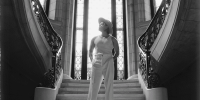About this tour
Conrad Sewell may have the down-to-earth candor of a pub singer, but his voice belongs in stadiums. “I still get butterflies just before going on,” Sewell says with a glint in his eye, his golden hair peeking under a wide-brimmed black hat. “It’s like jumping out of a plane. I love it.”
The acclaimed Brisbane-born singer and songwriter, 34, has been singing professionally since age TK, long enough to appreciate the affect his voice has on people. Case in point, 2015’s “Start Again,” a spare piano ballad showcasing Sewell’s powerhouse range, went to Number One in Australia from his debut studio album, LIFE. So when it came to recording his long-awaited follow-up, TKalbum, Sewell was adamant: it needed to sound raw. “I’ve never sounded as good on a record as I do in person,” he says. “There’s just a power there that doesn’t come across any other way.” Sewell started with a personal playlist of 60s, 70s and 80s soul pop and rock greats—Stevie Wonder, Rod Stewart, George Michael, and more—as his musical north star. Then he spent six weeks in Jackson Browne’s Santa Monica studio, where he wrote, produced, and cut all of the new material the old-fashioned way: in-person and with a cadre of like-minded soul addicts, including John Mayer guitarist Zane Carney and Black Crowes’ keyboardist Adam MacDougall.
“There were definitely those moments where we’re thinking, ‘Are people going to get it? Are these slick enough for radio?’” Sewell says. “But then we were like, you know what, we need to make this the album we’ve been dreaming of. There’s a lot of heart in this music, and it’s important for the world to hear some stuff like that now.”
c
The stripped down approach with TKalbum represented personal unburdening for Sewell—of all the expectations he never felt he was meeting in the music industry. Sewell signed his first major label deal at age 17. Sewell had the whole package: boy-band good looks, endless charisma, and a pliable soprano that conveyed the emotional depth of someone twice his age.
He spent years touring the world and finetuning his sound, first in the pop band The Frets, then the rock band Sons of Midnight. Sewell rebranded as solo act after his song with the Norwegian DJ/producer Kygo, “Firestone,” ignited the charts across Europe. Before long, Sewell was opening arenas for superstars like Ed Sheeran, Maroon 5, and Jess Glynne.
But in retrospect, Sewell questioned whether he was artistically ready to walk through the doors that kept opening for him. “I was like a puppet,” Sewell says. “I loved to write, so when someone would tell me to write an album like Calvin Harris, or Sam Smith, or whatever, I did it. But when it didn’t connect, I questioned everything. Is it me? Am I not good enough? What am I missing?”
After a long period of disillusionment, Sewell made it to the other side. TKalbum tells that intensely personal story, scars and all, from a sweeping array of musical vantage points: there
are orchestral swells, Houses of the Holy guitar solos, Daptone-style blues, and even bagpipes.
“Ego,” Sewell says, is the song that encapsulates the album. The bluesy track begins with hushed brass and syncopation that slaps you across the face. Sewell enters the confessional
and holds nothing back. “I’m the ultimate people pleaser,” Sewell says, “And this song is really about me getting over those tendencies, letting go of my ego, and having an honest look at myself.”
TKalbum kicks off with the vibrant punch of “God Save The Queen,” a Stones-y party jam about shaking off the invisible chains holding you down. “Ferris Wheel” is Sewell’s ode to big,
harmonica-blessed heartland rock. It’s hard not to think of John Mellencamp or Bruce Springsteen as Sewell sings of flashbacks and fairgrounds over a sun-dappled southern guitar.
Similarly, “Believer” thrums the electric intensity of chasing an unrequited love. “Said you would leave me for dead, but I woke up in your bed,” Sewell purrs.
Many of the songs find Sewell channeling his pain into the desire for romantic redemption that may never come, as on the spectral power ballad “Rolling Thunder. “Just know that we’re broken/ So many words left unspoken,” he sings. “Caroline” offers the colder side of “Ferris Wheel.” It’s a gorgeous string and acoustic-guitar ode to the long drives and glistening night skies of young love. “Slipping Away” follows that nostalgic thread (“If I could hold you again, I would/ Gotta lay down my pride”) but with a sensual, ‘70s flair. Here, Sewell’s falsetto reaches Bee Gee altitudes, as he basks in the glow of a ripping saxophone.
On “Blood Sugar” Sewell wields his heart like a ten-pound hammer. “Losing you was not my plan,” he sings. “It’s safe to say/ It comes in waves.” All of this emotionality builds to “Precious,” the album’s undeniable tour de force. The song was originally a ballad until Adam suggested doing a take that was faster, rougher around the edges. “I swear to God, it was like Joe Cocker came into the room and took over my body for six minutes,” Sewell says, still incredulous. “I started singing in this different voice, freestyling all the verses and everything that came out of my mouth just made perfect sense.” Just as Sewell said when he set out to make this record, the final version is nearly identical to that raw cut. And with all due respect to the ghost of Joe Cocker, Sewell wasn’t possessed in that take. He was experiencing, maybe for the first time, what it is to be truly free. “My gut’s always right but I never trusted it,” Sewell says in his gentle, self-deprecating way. “And it took hitting fucking rock bottom for me to realize my music depends on me believing in myself.”
